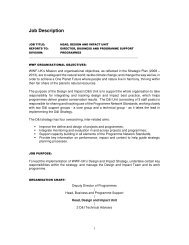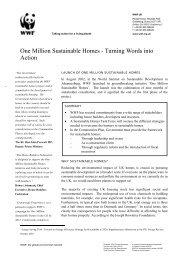Influencing Power - WWF UK
Influencing Power - WWF UK
Influencing Power - WWF UK
- No tags were found...
Create successful ePaper yourself
Turn your PDF publications into a flip-book with our unique Google optimized e-Paper software.
<strong>Influencing</strong> <strong>Power</strong>Results and Findings— Publishing a clear policy prohibitingpolitical contributions. Almost onequarterof the companies we reviewedmade statements banning the practice,although exceptions are often allowedwith senior approval, and ‘soft money’donations are rarely discussed (see Panel3.2). Royal Dutch / Shell seems to takethe toughest stance, banning politicalpayments and explicitly relating them tobribery and corruption.— Providing a listing of affiliations withbusiness groups focused on corporateresponsibility such as BSR, CSR Europeor the WBCSD. Note that few companiesalso disclose affiliations with industryassociations, a point we come back to inthe recommendations.— Publishing detailed policy positions onspecific legislative initiatives confrontingthe company or industry such as tradeand market access (for example Ford andHP) or climate change and the KyotoProtocol (many companies includingDuPont and Swiss Re).The consistency of this approach acrossdifferent companies and industry sectors islikely to be a consequence of the way inwhich the agenda has been driven (seeSection 3.2). Given that much of the energyfor greater consistency and transparencyhas come from external pressure, it isperhaps not surprising that responses areoften defensive in tone, with companiesaffirming their right to lobby andhighlighting their membership affiliationsas evidence of their commitment to theagenda. This is a point we pick up again inSection 4.In spite of continued concerns aboutcorporate lobbying, it is clear thattransparency has improved markedlyin the last few years.17What Would Integrated Look Like?3.6 RecommendationsNone of the companies we benchmarkedIn spite of continued concerns about received our top rating of integrated.corporate lobbying, it is clear that However, if such a company were to exist,transparency has improved markedly in the it would likely report on an approach thatlast few years. Nonetheless, we believe includes the following elements:there are steps companies can and shouldtake to help foster trust and minimise the Corporate governance and materialityrisks in this area by creating greater — There is a clear philosophy andtransparency and consistency in their structure to the role and objectives oflobbying. Figure 3.5 outlines specific company lobbying including recognitionrecommendations linked to our analysis of and explanation of the link betweencompanies’ current approaches.overall company principles and the roleof lobbying.— ‘Material’ issues are identified throughOther Actorsa systematic and transparent processthat considers the risks andWhile our focus in this report has been on opportunities deriving from the policycompanies, responsibility for fostering a framework, and which involves dialoguemore open and accountable approach to with stakeholders.public policy clearly does not lie solely with — The focus is on public policy activitythe corporate sector. Other actors including broadly defined, including softer formstrade associations and government have of influence, efforts beyond homecritical roles and responsibilities. Indeed, markets and policy at the global level.several of our reviewers commented that — Responsible lobbying is an explicit partlobbying transparency by business should of corporate business principles and/orbe matched by government transparency specific CR policies.regarding who they’ve been lobbied by.NGOs involved in public policy advocacy, Transparencytoo, need to improve their accountability in — Companies understand and explain thethis area. We have not, however, addressed relationship between core principles,these groups directly in our research and CR objectives and their sector-specificrefer readers to companion publications. 49 regulatory framework.— Policy positions on material issues aremade publicly available, linked toformal submissions to governmentcommittees, senior managementstatements on the issue, support forpolicy research on the agenda, etc.Consistency— Membership of industry associationsis disclosed, with an explanation ofwhere the company differs fromassociation positions on material issues.— Company works with other civilsociety groups on advocacy aroundshared public policy goals.— Where a company encounters proposedlegislation in line with its principlesbut where lobbies against it are basedon the design of specific tools orframeworks, the company’s positionincludes recommended adaptationsto allow the underlying objective tobe met.Panel 3.6














![[PDF] Causes for concern: chemicals and wildlife - WWF UK](https://img.yumpu.com/31929970/1/184x260/pdf-causes-for-concern-chemicals-and-wildlife-wwf-uk.jpg?quality=85)

